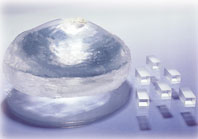
What is BBO crystal?BBO (beta-BaB2O4) is an excellent non-linear crystal for frequency-doubling (SHG) of Visible and Near IR laser light, OPO/OPG/OPA pumped by ultrafast pulses of wavelengths in the Near IR to UV, and sum-frequency mixing (SFM) into the Visible to the deep UV. BBO is one of the few practical crystal for use below 500 nm in SHG and SFM. BBO crystal has broad tunability, high damage threshold, and high efficiency. BBO’s small acceptance angle requires a very good beam quality and its large walkoff results in output beams that are very elliptical or slit-like. Type I is usually much more efficient than type II operation. BBO can not be used for NCPM (temperature tuned) application. |
BBO is very good for tunable laser sources, such as ultrafast Ti:Sapphire or dye lasers. And it is also widely used for SHG, 3HG, 4HG, and autocorrelation of femtosecond and picosecond Ti:Sapphire lasers; SHG, 3HG, 4HG, 5HG of YAG lasers at 1064 nm and 1320 nm to yield output of 212-660nm; SHG of tunable dye or solid-state laser sources from 410-750 nm to yield output of 205-375 nm, SFM of dye laser and YAG harmonics to yield output of 189-400 nm; DFM (difference-frequency mixing) from the Visible to the IR range up to over 3000 nm; OPO pumped with SHG or 3HG of YAG or Ti:Sapphire with an output range of 400-3000 ; Intracavity SHG of Argon ion lasers (488, 514 nm) or Copper vapor lasers (510 nm, 578 nm).
Properties of BBO
| Crystal Structure | Trigonal, space group R3c |
| Cell Parameters | a = b = 12.532Ã, c = 12.717Ã…, Z = 6 |
| Melting point | 1095+ 5°C |
| Transition temperature | 925+ 5°C |
| Optical homogeneity | d n ~ 10-6/cm |
| Mohs hardness | 4 |
| Density | 3.85 g/cm3 |
| Absorption Coefficient | < 0.1%/cm (at 1064nm) |
| Specific heat | 490 J/kg/°C |
| Hygroscopic susceptibility | low |
| Thermal expansion coefficients | a, 4 x 10-6/K; c, 36 x 10-6/K |
| Thermal conductivity | Perpendicular to c, 1.2 W/m/°C Parallel to c, 1.6 W/m/°C |
Linear Optical Properties
| Transparency range | 189-3500 nm |
| Refractive indices: | ne = 1.5425, no = 1.6551 @ 1064 nm ne = 1.5555, no = 1.6749 @ 532 nm ne = 1.6146, no = 1.7571 @ 266 nm |
| Therm-optic coefficients | dno/dT = -9.3 x 10-6/°C dne/dT = -16.6 x 10-6/°C |
Sellmeier Equations (l in mm)
| no2 (l) = 2.7359 – 0.01354l2+ 0.01878/(l2-0.01822) ne2(l) = 2.3753 – 0.01516l2+ 0.01224/(l2-0.01667) |
Nonlinear Optical Properties
| Phase-matchable output wavelength | 189 – 1750 nm |
| NLO coefficients | d11 = 5.8 x d36 (KDP) d31= 0.05 x d11 d22 < 0.05 x d11 |
| Electro-optic coefficients | y11 = 2.7 pm/V |
| Half-wave voltage | 48 KV (at 1064 nm) |
| Damage threshold | 5 GW/cm2 (10 ns) @1064nm 10 GW/cm2 (1.3 ns) @ 1064 nm 1 GW/cm2 (10 ns) @532 nm 7 GW/cm2 (250 ps) @ 532 nm |
Capabilities of Photonchina |
||
| Material | β-BBO Crystal |
|
| Thickness | 0.01mm-20mm | |
| Surface Quality | 10-5 | |
| Optical Axis Orientation | 3 arc min | |
| Parallelism | <10 ace sec | |
| Flatness | λ/10@633nm | |
| Clear Aperture | >95% | |
| Coating | P-coating or AR coating | |
| Mount | Upon Customer’s Specification | |
BBO Typical Specifications
| Thin crystals: (5-10) x (5-10) x (0.01 – 1) mm3 |
| Regular sizes: 4 x 4 mm2 to 20 x 20 mm2 in diameter, 3 – 20 mm in length |
| Different cuts, sizes and AR coatings are available upon request. |
| BBO is hygroscopic. In application, protective coating or AR coating or crystal housing is usually recommended. |
